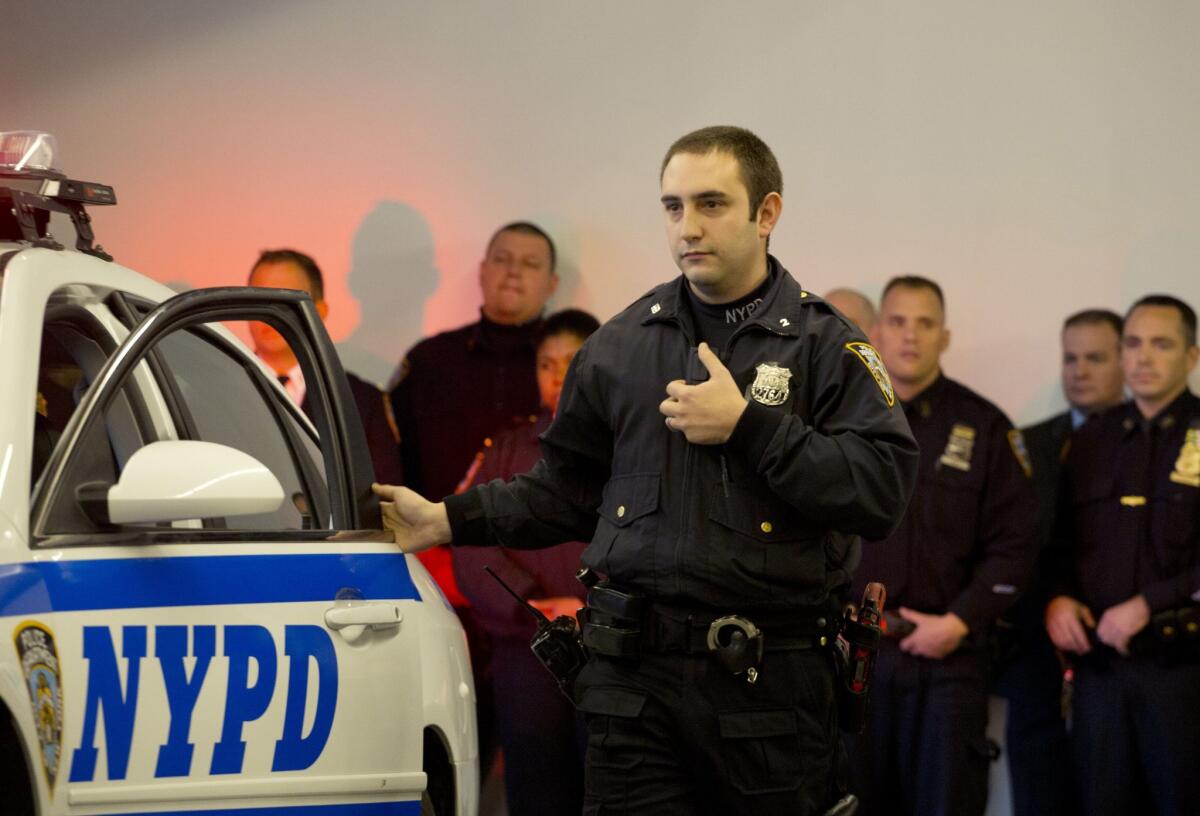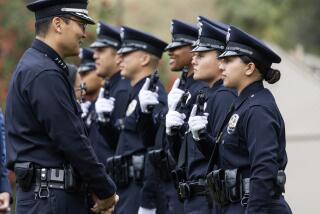Op-Ed: What’s the right police body camera policy?

New York Police Department officer Joshua Jones turns on a body camera attached to his chest during a traffic stop training demonstration for the media in New York last December.
- Share via
Body cameras are on the verge of changing policing as we know it. But along with the promise of more transparency and accountability come tough policy choices. A particularly thorny question is whether officers who use force against individuals should be permitted to view the video footage of their encounters before writing their incident reports.
After grappling with this issue, the Los Angeles and the New York police departments are opting to permit the viewing of the footage. This decision has been met with criticism from civil rights advocates, newspaper editorial boards and academics.
Critics claim that watching the video will alter the officers’ memory of the incident. But this isn’t necessarily a bad thing. Human memory of complex and highly charged events is invariably incomplete. Police officers cannot be expected to encode and retain every one of the countless details that make up a use-of-force incident.
Human memory is also susceptible to a host of biases. Like the rest of us, police officers are bound to remember events in ways that protect their sense of self and justify their actions. Exposure to the video footage will almost certainly enable them to provide richer and more accurate accounts of the incident.
But the critics’ main objection to the policy is that it will promote dishonest reporting. Officers, it is feared, will tailor their reports to fit the captured images, revealing only what could not be plausibly denied and leaving out other important details. This objection doesn’t withstand scrutiny.
In general, watching body camera footage should reduce dishonesty in incident reports. When the footage reveals unambiguous misconduct, officers would be foolish to file dishonest reports. And when the footage reveals proper behavior, officers would feel emboldened to present their actions honestly and confidently.
It’s important to consider the detrimental consequences of depriving police officers of video that contains information directly pertinent to their fate. It would send a stinging message of distrust. Psychologists have demonstrated that distrust sets in motion a dynamic that breeds dishonesty. Likewise, researchers have shown that institutionalized distrust can foster cynicism that brings about violations of an organization’s standards and practices.
Moreover, depriving officers the right to view the video of an incident before they write their reports will often set them up for failure. In the eyes of a skeptical public, the unfavorable comparison of the officers’ inevitably imperfect memories to the video footage will likely be perceived as evidence of deceit. Rather than experience body cameras as a vital ally, officers will come to perceive them as a threat, an enemy.
Most important, dire predictions of deceitful reporting fail to appreciate the overall potential of this technological revolution to elevate policing to a new level. The transparency of officers’ actions and the ensuing sense of accountability are bound to improve the decisions they make and the actions they take. Video footage will provide police superiors with a potent tool for reliable supervision, debriefing and disciplining, enabling them to condemn bad police work and commend the good.
It should also provide officers with a platform for reflection, self-criticism and self-improvement. The heightened accountability might also nudge officers with violent dispositions out of the force, and thus make way for more amenable candidates. And it should improve the relationship between police forces and their constituent communities.
In the end, the use of body cameras should both reduce the use of force and lessen the need and the opportunity to lie about it. Encouraging evidence that supports this has already been obtained in studies conducted with police departments in the field.
For too long, illegal use of force by police officers has been shrouded from public view by means of dishonest reporting. This virtual impunity has undoubtedly contributed to incidents of abuse and perhaps also to unjustified killing of civilians. It has fed citizens’ distrust in police reporting and an impulse to shut down any prospect of dishonesty. But that impulse could undermine the monumental benefits that can be reaped from body cams.
Rather than expect the worst from our officers, we should empower them to use all the advantages of body cameras to become more professional and more accurate public servants. As long as they do not prove us wrong, we must trust them to do so.
Dan Simon is a professor of law and psychology at USC and the author of “In Doubt: The Psychology of the Criminal Justice Process.” Jim Bueermann is the president of the Police Foundation in Washington and a retired police chief.
Follow the Opinion section on Twitter @latimesopinion and Facebook
More to Read
A cure for the common opinion
Get thought-provoking perspectives with our weekly newsletter.
You may occasionally receive promotional content from the Los Angeles Times.









